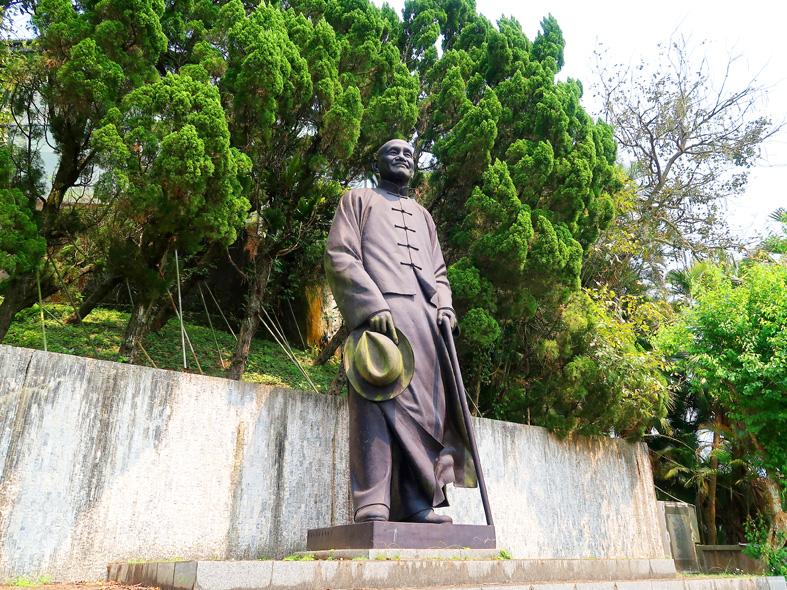As of Wednesday, 403 authoritarian symbols had been removed or were scheduled for removal, while 537 were still in place, Transitional Justice Commission data showed yesterday, although the Ministry of National Defense, Ministry of Education and the Veterans Affairs Council had yet to report on such symbols under their jurisdiction.
More than 40 statues or other authoritarian symbols have been excised since August last year, after the central government removed an additional 11 and local governments eliminated 32, data showed.
However, the status of the 410 items managed by the ministries of defense and education is unclear.

Photo: Chen Yu-fu, Taipei Times
Of the 537 symbols still remaining in public areas, 84 are managed by the central government and 453 by local governments, although the figure does not include those managed by the three agencies.
Kaohsiung, as well as Miaoli, Yunlin, Hualien and Penghu counties, also had yet to respond to the commission.
The Presidential Office manages four statues, all of which are at former president Chiang Ching-kuo’s (蔣經國) mausoleum in Taoyuan’s Dasi District (大溪), and have not been removed, the data showed.
The Legislative Yuan has agreed to remove the bronze statue of former president Chiang Kai-shek (蔣介石) from its service center in Taichung, but as it is located on the grounds of the former Taiwan Provincial Consultative Council, officials are deliberating whether it should be considered a cultural asset, the commission said.
The Examination Yuan is also to change the names of three locations and remove two bronze statues under its jurisdiction, it added.
Of the 14 authoritarian symbols managed by the Ministry of the Interior, nine statues are to be removed and five names changed, including Zhongzheng Hall (中正堂) on the Pratas Islands (Dongsha Islands, 東沙群島), which has already been renamed, it said.
Two statues managed by the Ministry of Economic Affairs have yet to be removed, including a large bronze statue of Chiang Kai-shek in a long robe and magua at Taoyuan’s Shihmen Reservoir (石門水庫), which is inside a paid scenic area, the report said.
Meanwhile, the Veterans Affairs Council has moved five of the 61 authoritarian symbols under its jurisdiction to storage or the National Property Administration, and is awaiting approval for them to be removed permanently, the commission said.
A bronze statue of Chiang Kai-shek remains at the National Palace Museum in Taipei, as do two administered by the Council of Agriculture, it added.
The Ministry of Culture manages 13 statues, one of which is at the Green Island White Terror Memorial Park, while the rest are at the Chiang Kai-shek Memorial Hall in Taipei, it said, adding that 12 are still in place.
The commission said that it this month plans to submit recommendations for dealing with the memorial hall.
In addition to the Veterans Affairs Council’s efforts, Taipei has agreed to remove 40 authoritarian symbols, while all three of Chiayi City’s bronze statues have been eliminated, a commissioner told reporters, vowing to continue negotiating with central government agencies and local governments to remove those remaining.

Taiwan has received more than US$70 million in royalties as of the end of last year from developing the F-16V jet as countries worldwide purchase or upgrade to this popular model, government and military officials said on Saturday. Taiwan funded the development of the F-16V jet and ended up the sole investor as other countries withdrew from the program. Now the F-16V is increasingly popular and countries must pay Taiwan a percentage in royalties when they purchase new F-16V aircraft or upgrade older F-16 models. The next five years are expected to be the peak for these royalties, with Taiwan potentially earning

POSITIVE DEVELOPMENT: Japan and the US are expected to hold in-depth discussions on Taiwan-related issues during the meeting next month, Japanese sources said The holding of a Japan-US leaders’ meeting ahead of US President Donald Trump’s visit to China is positive news for Taiwan, former Japan-Taiwan Exchange Association representative Hiroyasu Izumi said yesterday. After the Liberal Democratic Party’s landslide victory in Japan’s House of Representatives election, Japanese Prime Minister Sanae Takaichi is scheduled to visit the US next month, where she is to meet with Trump ahead of the US president’s planned visit to China from March 31 to April 2 for a meeting with Chinese President Xi Jinping (習近平). Japan and the US are expected to hold in-depth discussions on Taiwan-related issues during the

‘LIKE-MINDED PARTNER’: Tako van Popta said it would be inappropriate to delay signing the deal with Taiwan because of China, adding he would promote the issue Canadian senators have stressed Taiwan’s importance for international trade and expressed enthusiasm for ensuring the Taiwan-Canada trade cooperation framework agreement is implemented this year. Representative to Canada Harry Tseng (曾厚仁) in an interview with the Central News Agency (CNA) said he was increasingly uneasy about Ottawa’s delays in signing the agreement, especially as Ottawa has warmed toward Beijing. There are “no negotiations left. Not only [is it] initialed, we have three versions of the text ready: English, French and Mandarin,” Tseng said. “That tells you how close we are to the final signature.” Tseng said that he hoped Canadian Prime Minister Mark Carney

STAY IN YOUR LANE: As the US and Israel attack Iran, the ministry has warned China not to overstep by including Taiwanese citizens in its evacuation orders The Ministry of Foreign Affairs (MOFA) yesterday rebuked a statement by China’s embassy in Israel that it would evacuate Taiwanese holders of Chinese travel documents from Israel amid the latter’s escalating conflict with Iran. Tensions have risen across the Middle East in the wake of US and Israeli airstrikes on Iran beginning Saturday. China subsequently issued an evacuation notice for its citizens. In a news release, the Chinese embassy in Israel said holders of “Taiwan compatriot permits (台胞證)” issued to Taiwanese nationals by Chinese authorities for travel to China — could register for evacuation to Egypt. In Taipei, the ministry yesterday said Taiwan